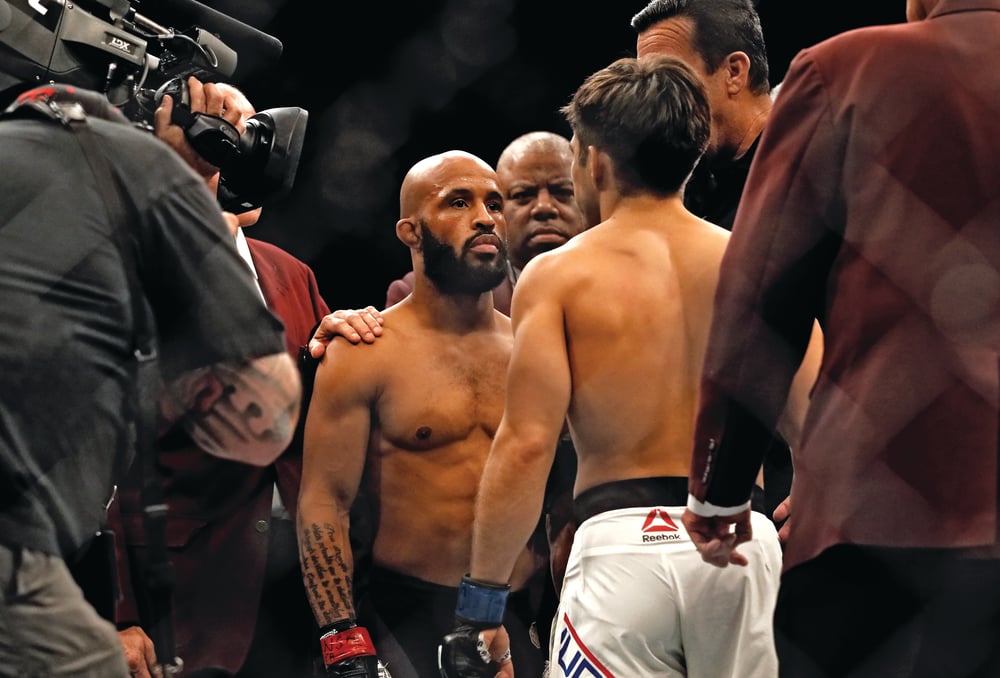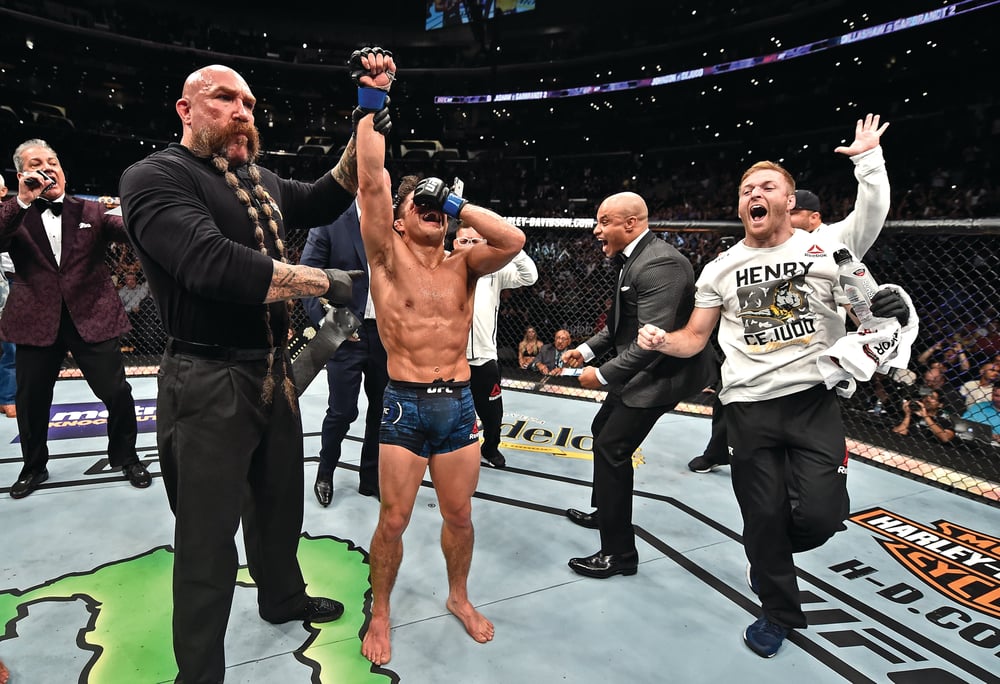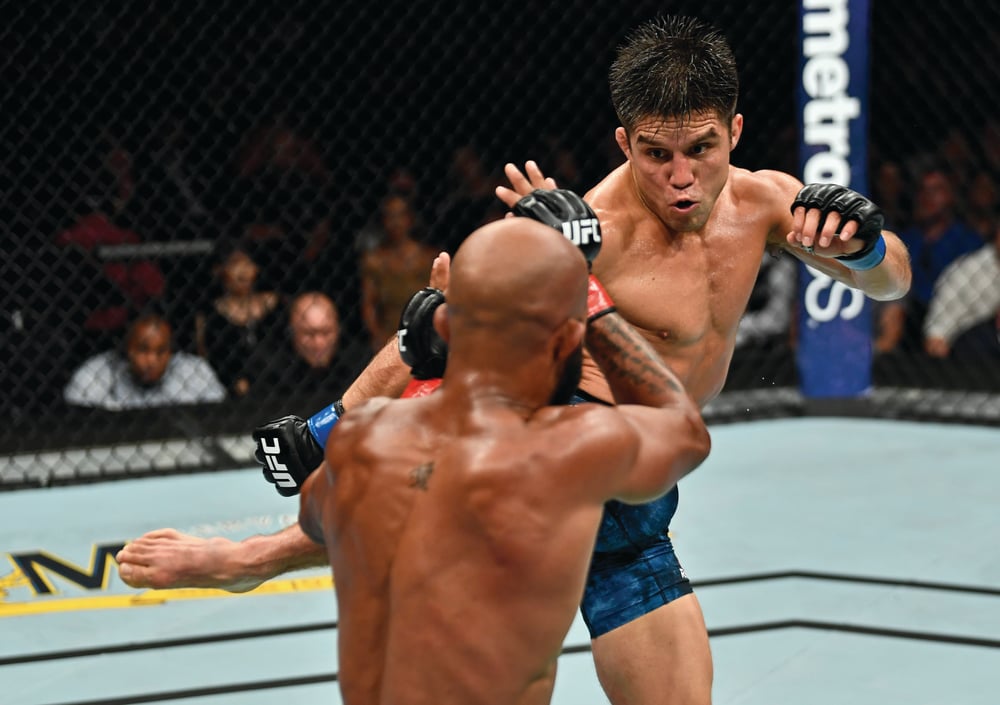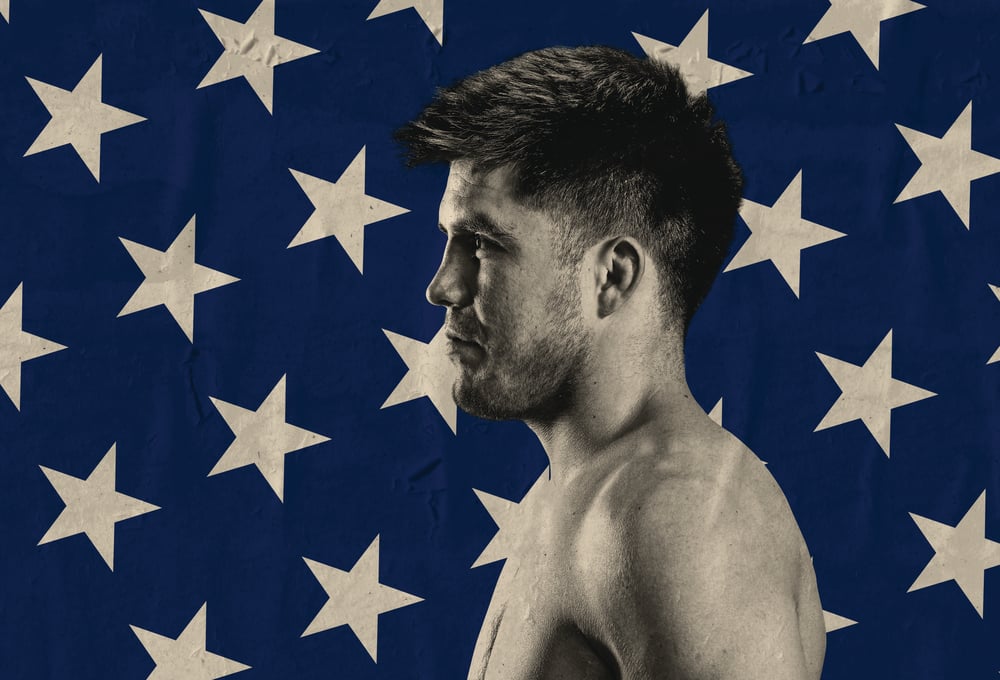
Issue 172
November 2018
His sensational defeat of Demetrious Johnson has catapulted Henry Cejudo into the big time as holder of the UFC flyweight belt and into the eye of a media storm, writes Gareth A Davies.
The greatest comeback story ever in fight sports. The triumph of the human spirit. That’s how Henry Carlos Cejudo, holding court in Las Vegas ten days after defeating Demetrious Johnson to claim the UFC flyweight belt, considers his life story.
The youngest of seven siblings, from a Mexican immigrant family into the United States, always the underdog, but never beaten.
So the 31-year-old world champion explains, while ironing his own shirt in his hotel suite, as he opens up about his life and struggles and how he is named ‘The Messenger’ when he fights for a very special, and poignant reason.

Cejudo has not stopped with a round of media calls, television shows and fan meetings since having his hands raised in a very close fight against the record-breaking former champion Demetrious ‘Might Mouse’ Johnson, a man who knocked him out in the first round, the first time they met.
Cejudo is tireless with the media because he wants his message out there: the message that he has always had a fight on his hands.
He wants the world to know how he got there, how he hauled himself through life. With love and against adversity, making sacrifice after sacrifice to get to the place where the narrative of his life can be told with the greatest impact.
Cejudo has wisdom from his life experiences, from his Olympic gold medal in Beijing in 2008 as a freestyle wrestler. And now as a UFC champion, with victory over one of the greatest technical mixed martial artists of all time. “My message to people is to believe in that comeback story, understand that life is a fight,” he says.
“Life is not just a fight in the cage, a fight in the Octagon,” he continues. “It’s a fight with your dreams, life is a fight with adversity. Life is a fight with drama. You’ve got to be able to learn how to play this game called life, turn life into a fight. And you can win. That’s exactly what it has been for me, and I know there are so many people going through the same thing, wherever they are from, whatever stage they are at in their own lives. I was able to do this because of my upbringing, because of nature, and the nurture I received growing up. I was able to overcome because I have been through these fires before...”
There is deep significance in Cejudo’s last words.

At this point, Eric Albarracin, one of his team – wrestling coach, mentor, team-mate, cornerman, and a former captain in the American military – who is with him in Las Vegas, on these media rounds, steps in to underline Cejudo’s achievements.
The message, Albarracin insists, is what has driven Cejudo to this point.
“Henry is that person who people can turn to as an example,” says Albarracin. “That’s why they call him ‘The Messenger’. That’s the message he brings. He’s a role model.
"He’s the face of overcoming adversity. He almost died in the Santa Rosa fires [in Northern California, in November 2017, which destroyed almost 3000 homes] which killed so many people. He fled from his hotel as the city was burning down. Six weeks later he was fighting Sergio Pettis. There are so many things he has had to overcome.”
The former military man who worked in the TUF series and with the Nogueira brothers, Junior Dos Santos, the Pitbull Brothers, and many more, added: “Growing up, where he came from, getting to where he is at, sacrificing a lot of his teenage years to chasing this dream. He’s a person who dreamt big and went out there and achieved those dreams. And that’s always something to inspire people. It’s no exaggeration to say his is the greatest comeback story ever.
“From 2008,” he continues, “when Henry was the youngest wrestling gold medallist [from the USA] in Olympic history, ranked 31st when he went into the Olympic tournament, through this MMA journey, there is a life force running through him that should be set out there as an example to people.”
Cejudo’s rise to this place is certainly exceptional. His father quit the family early, leaving his mother to raise seven children. Henry was the baby, but not for long. “I was raised by a single mother. My mother is a special lady, my mum had three jobs and it meant that as children we raised each other in some ways. My brothers and sisters kind of raised me just as much because my mother was so busy working, you know... so that’s the gist of my upbringing. Mine was a very humble upbringing.”
It meant that Cejudo was transformed into a man early in life. He had to be.
Wrestling was the conduit. “By the time I started wrestling, the coaches were saying that I was special. Everybody knew that I was different, and a special kid because I had athletic gifts. By the age of 11 or 12, I was psychologically different. I was already thinking, ‘OK, I’m a future world champion at whatever sport I’m going to do’.
That really was how I thought about it. As that 11-year-old boy, I knew that my life was going to mean a lot of sacrifices for me to accomplish that victory of being an Olympic champion, and now, as it has worked out, a UFC world champion.”

We laugh about him doing his own ironing, as he prepares for another media assignment on television, this time in Spanish, in which he will talk about his life, and reach out to the vast Hispanic community for whom he is clearly a beacon, an example of what can be attained.
“I have done so much since winning the belt, it has almost worn me out. But I want them to hear my message. It’s not about me no more, it’s about the people who are in the struggle, in the fights that they are going through, their adversity, it’s for them...”
Back to the two fights with ‘Mighty Mouse’, and Cejudo is crystal clear about what he went through the first time, and how they planned for the second assignment to win the crown.
“DJ was a problem, and we studied him,” reflects Cejudo. “Look, I’m a competitor. It’s not every day you get a title shot. I knew going into the UFC first of all, I’d get a title shot quick. I knew within a year I’d be in negotiations for a title fight and I was. When you’re an athlete and you have a name and you’re a gold medallist, that’s what happens. People will push you forward faster than the average fighter.”
Then, boom. As it turned out, Mighty Mouse put him away in the opening round. “It was a humbling moment,” he explains. “You see people get knocked out and stopped and think that will never happen to you. ‘No way, you tell yourself. I’m too strong and fast.’
"I’m not saying I think I’m invincible, but I was very confident that would never happen.
"When it happened I was like, Damn, nobody is that strong for something not to happen. Nobody is perfect. It humbled me a little bit. I always respected my opponents but more so after that. I really believed I could beat Demetrious Johnson because of my style. I’d always said if I can take him into deep waters and use my wrestling, it would be a hard night for him.
"But the smarter fighter, the best pound-for-pound fighter in the world beat me that night. He can wrestle, he can submit, he can strike. He’s the fastest dude in the UFC.”

The second time around, it was very different. “We did everything we could to prepare for that second meeting. We used sports psychology, we added sports science for the physical side of it,” he recalls. “We got the coaches on board, getting everybody to buy into the program towards winning. That’s just the way it was, it wasn’t just the mindset we went into the fight with. It was about being honest and recognizing that against DJ, anything could happen. It was the fight of my life, and I knew I was going to have to go in there and throw the kitchen sink, get technical, and wrestle him.”
What transpired was a very close five-round fight, but the tenacity of Cejudo, his relentless desire and ability to control the reigning champion made the judges see enough to give him a very close split decision. “For me, it is a masterpiece, a perfect storm that made it happen.”
Now, with the belt under his control, the future. Cejudo wants UFC bantamweight champion TJ Dillashaw at flyweight, and the two fighters have done their best to drive that fight.
TJ wants it. The Messenger wants it. It looks like the UFC wants it too.
There’s no love lost, either. “TJ can get it however he wants it. I want that snake head on a platter. That’s all I have to say... and I want that out there,” he states. “I would prefer to go up [in weight] but he wants to come down, I have no problem with him coming down...I’m going to shock the world again, just watch.”
There is a moment of reflection, amongst all these wise words. The thing that sticks in his mind, the most salient word and feeling, he reveals is “satisfaction” right now. “Yes, I do feel a deep satisfaction, man. These are goals that I set out when I was a 17-year-old kid. I wrote down my goals. I read the book ‘Rich Guy Poor Guy’ and it said to write your goals down. I read the whole book and I did that, and it’s cool to recognize that I have accomplished something. It’s a cool testament to who Henry Cejudo is...”

He wrote his own book, of course, American Victory: Wrestling, Dreams and a Journey Toward Home. It chronicled his life and his struggles in winning Olympic gold, The UFC title, being a pro fighter, has provided an even richer extra chapter.
The life of a freestyle wrestler was hardly glitz and glamour, he explains. “In wrestling, we were considered amateur. We got amateur money. Even though it’s a professional sport. We don’t have government involvement. It’s sad for a lot of [Olympic/World] gold medallists because all they know how to do is box, or wrestle or such and such, and they never really develop these life skills or learn how to work with people.
"Some athletes really do need it. I was able to write a book and have different things that come out of the corporate world rather than government issues and money issues. The MMA world has made who I am, a little bit more special because of the platform the UFC has.”
Writing his book brought a great sense of validation. My American Victory is out in seven different countries. "I got a chance to share my story with people, my upbringing. I’m the son of Mexican immigrants. It’s about the life of an Olympic champion, the struggle, the family side of things.”
With recent events, there could be a second tome written. “I still feel there’s another book there to be written,” he reveals. “A lot more things need to be highlighted. Friends, family, as you get older you understand more the importance of life. I wish I would have said a little bit more about ‘x person’.
"It’s true when people say you’ll never truly be happy with the book you’ve written. I’m pretty satisfied but knowing what I know now, I’d have put more emphasis on certain things.”
“My legacy is to be a champion in life,” he continues. “I want to be an inspiration and give everyone a piece of who Henry Cejundo is. I always wanted to be a world champion, and I am, but more important is the kind of person I am.”
And a very special one at that... with a comeback story for the ages.
...









